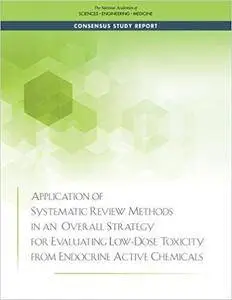Application of Systematic Review Methods in an Overall Strategy for Evaluating Low-Dose Toxicity from Endocrine Active Chemicals by Engineering, and Medicine National Academies of Sciences
English | Aug. 14, 2017 | ISBN: 0309458625 | 423 Pages | PDF | 31 MB
English | Aug. 14, 2017 | ISBN: 0309458625 | 423 Pages | PDF | 31 MB
To safeguard public health, the US Environmental Protection Agency (EPA) must keep abreast of new scientific information and emerging technologies so that it can apply them to regulatory decision-making. For decades the agency has dealt with questions about what animal-testing data to use to make predictions about human health hazards, how to perform dose-response extrapolations, how to identify and protect susceptible subpopulations, and how to address uncertainties. As alternatives to traditional toxicity testing have emerged, the agency has been faced with additional questions about how to incorporate data from such tests into its chemical assessments and whether such tests can replace some traditional testing methods.
Endocrine active chemicals (EACs) have raised concerns that traditional toxicity-testing protocols might be inadequate to identify all potential hazards to human health because they have the ability to modulate normal hormone function, and small alterations in hormone concentrations, particularly during sensitive life stages, can have lasting and significant effects. To address concerns about potential human health effects from EACs at low doses, this report develops a strategy to evaluate the evidence for such low-dose effects.



